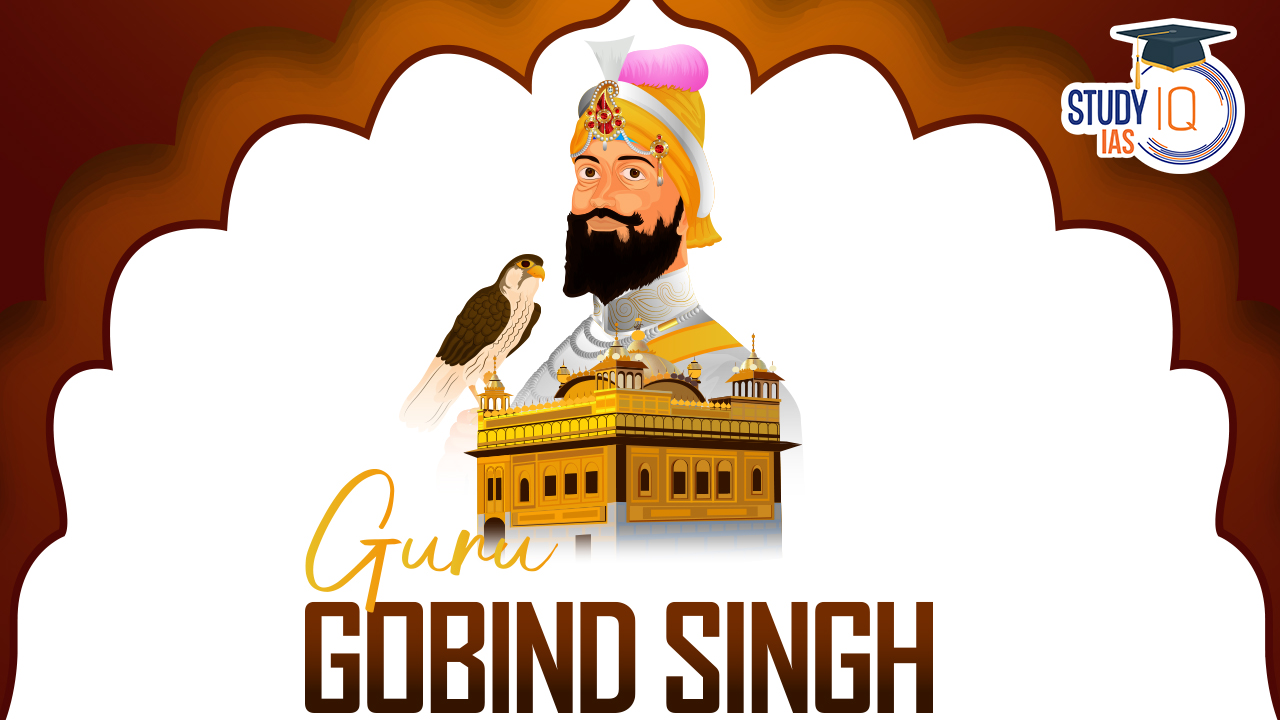Table of Contents
Guru Gobind Singh (1666–1708) was the tenth Sikh Guru, spiritual leader, and warrior-poet. Born as Gobind Rai, he became a Guru at the young age of nine after the martyrdom of his father, Guru Tegh Bahadur. Guru Gobind Singh is revered for establishing the Khalsa, a community of initiated Sikhs, and for defending religious freedom against Mughal oppression.
We’re now on WhatsApp. Click to Join
Guru Gobind Singh Jayanti 2024
Guru Gobind Singh’s birthdate, according to the Julian calendar, is December 22, 1666. Celebrated annually based on the Nanakshahi calendar, the festival, Guru Gobind Singh Jayanti, occurs in either December, January, or both in the Gregorian calendar. As the 10th Sikh Guru of Nanak, his birthday is a significant event celebrated worldwide. Devotees engage in religious activities at gurdwaras, and morning processions, known as “Nagar Kirtans,” draw large crowds. These processions involve the singing of devotional songs. Guru Gobind Singh Jayanti is also referred to as Prakash Utsav, marking the illumination of his divine presence.
Guru Gobind Singh ji Birthday 2024
Guru Gobind Singh Jayanti, the birthday of the 10th Sikh Guru, is celebrated on January 17, 2024. The day is also known as Prakash Parv. Guru Gobind Singh was a poet, writer, warrior, and philosopher. The day is celebrated with pomp and happiness. Guru Gobind Singh Jayanti is a restricted holiday in India, so government offices, businesses, banks, and public transportation services may remain open.
Guru Gobind Singh Biography
Guru Gobind Singh (1666-1708) was the 10th and final human Guru of the Sikhs. He was born Gobind Rai on December 22, 1666, in Patna, Bihar, to the ninth Sikh Guru, Guru Tegh Bahadur, and Mata Gujri. Guru Gobind Singh became the spiritual and temporal leader of the Sikhs on November 11, 1675, at the age of nine. He held the guruship for 33 years, until he passed away in 1708.
Guru Gobind Singh was a warrior, poet, and philosopher. He was also a linguist familiar with Persian, Arabic, and Sanskrit as well as his native Punjabi. Guru Gobind Singh is known as “Kalgidhar Paatshah” and is depicted wearing a turban adorned with a white plume, a sword on his hip, and a bow and arrows on his back.
Early Life of Guru Gobind Singh
- Birth and Childhood: Guru Gobind Singh was born in the Sodhi Khatri family. His birthplace, Patna Sahib, is now a sacred pilgrimage site known as Takht Sri Harmandir Sahib. He spent his early years in Anandpur Sahib, where he received education in various languages, martial arts, and religious scriptures.
- Guru Tegh Bahadur’s Martyrdom: In 1675, Guru Tegh Bahadur, Guru Gobind Singh’s father, was executed by the Mughal emperor Aurangzeb for standing up against religious persecution and defending the rights of non-Muslims.
Guru Gobind Singh Guruship
- Guru Gobind Singh Becomes Guru: Following his father’s martyrdom, Guru Gobind Singh assumed the Guruship at the young age of nine in 1675. He became the tenth Guru of the Sikhs.
- Creation of Khalsa: In 1699, Guru Gobind Singh initiated the Khalsa, a special community of baptized Sikhs. He performed the Amrit Sanskar (baptism ceremony) and gave the Sikhs the Five Ks:
- Kesh (uncut hair),
- Kara (steel bracelet),
- Kanga (wooden comb),
- Kachera (cotton undergarments), and
- Kirpan (sword).
- This marked a significant transformation in Sikhism and gave birth to the Khalsa Panth.
Military Leadership of Guru Gobind Singh
- Defender of Dharma: Guru Gobind Singh was a skilled warrior and military strategist. He took up arms to defend the oppressed and fight against tyranny and injustice.
- Battles and Warfare: Guru Gobind Singh faced numerous battles against the Mughals and other adversaries who sought to suppress the Sikh community. He fought the battles of Bhangani, Nadaun, and others, displaying exceptional courage and leadership.
Literary Contributions of Guru Gobind Singh
- Poetry and Literature: Guru Gobind Singh was a prolific poet and writer. He composed hymns and poems that are now included in the Guru Granth Sahib, the holy scripture of Sikhism. His literary contributions emphasize equality, justice, and devotion to God.
- Dasam Granth: Guru Gobind Singh also compiled the Dasam Granth, a religious scripture containing his compositions, including the famous “Chandi Di Var” and “Jaap Sahib.”
Legacy of Guru Gobind Singh
- Death: Guru Gobind Singh passed away on October 7, 1708, in Nanded, Maharashtra. Before his death, he declared the Guru Granth Sahib, the holy scripture, as the eternal Guru, ensuring that the spiritual guidance for Sikhs would be through the scriptures.
- Eternal Guru and Inspirational Leader: Guru Gobind Singh’s legacy lives on through his teachings, writings, and the Sikh community. He is remembered as a spiritual leader, warrior, and poet who stood for justice, equality, and the defence of religious freedom.
Guru Gobind Singh UPSC
Guru Gobind Singh (1666-1708), the tenth Sikh Guru, became Guru at nine after his father’s martyrdom. He established the Khalsa and fought against Mughal oppression. Guru Gobind Singh Jayanti is celebrated annually, marked by religious activities and processions. Born in Patna, he assumed Guruship at nine, creating the Khalsa in 1699. A warrior, poet, and philosopher, he led battles against tyranny. His literary contributions and the Dasam Granth are integral to Sikhism. Guru Gobind Singh passed away in 1708, declaring Guru Granth Sahib as the eternal guide. His legacy emphasizes justice, equality, and religious freedom.


 Padma Shri awardee Baiga Tribal Artist J...
Padma Shri awardee Baiga Tribal Artist J...
 Potti Sriramulu Biography and Achievemen...
Potti Sriramulu Biography and Achievemen...
 Sardar Vallabhbhai Patel Biography, Deat...
Sardar Vallabhbhai Patel Biography, Deat...




















